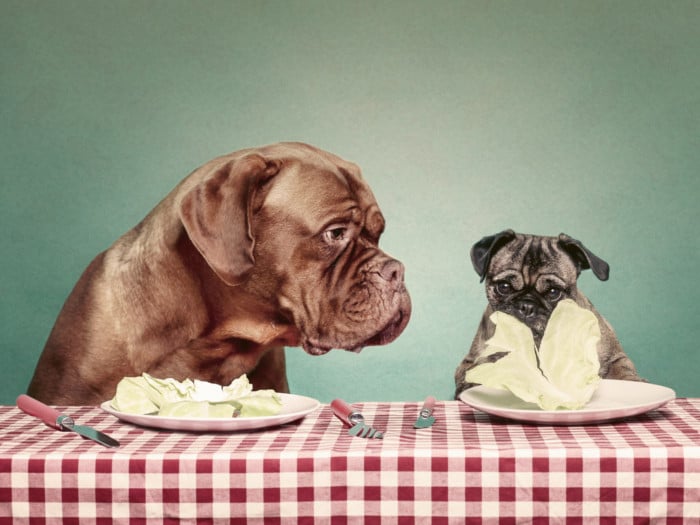Dog parents get stressed out when they see their baby not eating. The first thing that comes to your mind when your dog won’t eat is probably that it is sick and in pain, but this is rarely the case.
Reasons Why a Dog Won’t Eat
Usually, it is the matter of having a picky eater, overfeeding, or boredom. Once you ruled out overfeeding, read these 25 possible reasons why your dog won’t eat and get at the bottom of things.
Not Hungry
Dogs give the impression that they can eat all day long without stopping, but that isn’t the case. It can refuse to eat simply because he isn’t hungry at the moment. [1]
Food Isn’t Tasty
Generally, dogs aren’t picky but on some days your pup may want to eat something different. Try mixing kibble with canned food or add a topping to spice things up.

As per research, cabbage is safe for dogs to eat as it aids in digestion. Photo Credit: Shutterstock
Upset Stomach
Loss of appetite that is followed by diarrhea and vomiting is caused by an upset stomach. Offer boiled chicken meat and rice that will soothe the stomach, encourage eating, and firm up the stool. If you don’t see any improvements in two days take your dog to the vet.
Dental Problems
It is difficult to do anything when a tooth hurts, and if this is the case your dog won’t eat. Inspect his teeth and mouth, and take him to a vet if he has bleeding gums or loose and rotten teeth.
Vaccination
Some dogs can react after they get their shots and stop eating, but this is a passing thing and will clear up after one day. The same thing goes for any new drugs your dog is currently taking. You should try to appeal to his senses with canned dog food and talk to a vet about the change of treatment.
Poor Food Quality
Even though cheaper food contains a variety of additives and flavors that improve its taste some dogs still don’t like it. To a dog that ate better quality food, cheaper versions may be unappealing which results in loss of appetite.
Treats
A dog can stop eating if you give him too many treats. Additional calories will keep his belly full and he will refuse to eat his normal food.
Spoiled Food
Dogs have better senses than we do and will refuse to eat food that tastes and smells bad. If your dog won’t eat his meal, check the expiration dates on the packaging and throw away any spoiled food.
Pain
Dogs can hide when they are in pain, but none the less, look for signs of lethargy, difficulty breathing, and pacing combined with the loss of appetite. If you notice any of these take your dog to a vet.
Environmental Changes
Some dogs don’t cope well when introduced to new people and environment which results in the loss of appetite. Try to adjust your dog to new situations and talk to a vet or a trainer for additional treatment options.
Anxiety
Anxiety is the state of hyperawareness that some dogs experience when they are left alone. A dog can be afraid that you left him which results in loss of appetite. In cases like this, you should consult with a behaviorist who will help your dog overcome his trust issues.
Bad Day
Just like us, dogs react to different environmental factors. Either one can cause your dog to feel blue and reluctant to eat. Try offering boiled chicken and rice or wet dog food to encourage his appetite.
Change in Routine
Dogs love to have a certain schedule about their days, and every time something is changed your dog can stop eating. It is important to stick with already created routines, and if you need to change them, do that over a period of time that will allow your dog to adjust.
Dog is Bored
Eating the same type of food for long periods of time can cause a dog to stop eating. Try spicing the food with a topping or change the brand entirely to encourage eating.
Another Pet
A more dominant dog can intimidate a submissive one and cause him to stop eating. If this is the case in your home, separate your dogs during the meals and provide a safe and calm environment for a submissive one to eat in peace.
Picky Eater
Some dogs are born to be picky and it is up to you to figure out what your dog loves to eat. Be prepared for some trial and error and once you find the food your dog likes, stick to it.
Table Scraps
Feeding your dog with table scraps before his dinner will result in loss of appetite. You should stop feeding your dog with human food and reintroduce him to the smell and taste of dog food.
Sickness
Loss of appetite is sometimes the first symptom of a disease so you should monitor your dog for additional signs of illness. If he stops drinking water, has diarrhea, fever, or trouble walking, take him to a vet immediately.
Age
Senior dogs have troubles chewing and start to lose their senses, which can cause loss of appetite. Try offering canned food or a topping to get your dog eating again.
New Dog
Once you buy or adopt a dog he needs time to adjust to his new surroundings. To stimulate his appetite, give him the same food he ate at the breeder or in the shelter.
Too Much Food
Overfeeding is a big problem for many owners, and it can cause a dog to stop eating. In most cases, a dog will start eating once he is hungry again.
Ingested Toxins
If you suspect that your dog was exposed to toxins take him to a vet right away. Besides the loss of appetite, he will experience diarrhea, drooling, nausea, and difficulty breathing.
Change
Some dogs react to changes in the family dynamics and stop eating as the result. Try tricking your dog with canned food or a topping to get him to start eating.
Intestinal Blockage
Every once in a while a dog swallows something that lodges in his intestines and causes him to stop eating. If you suspect that it ingested a piece of toy, take him to the vet immediately.
Recovery
Loss of appetite isn’t an uncommon thing when a dog is recovering from an illness. You should try to make the food more flavorful, praise and encourage it to eat again. If this doesn’t work and your dog won’t eat the whole day, call your vet.
Conclusion
Loss of appetite isn’t only a sign of illness it is also your dog’s way of communicating with you. It can be as simple as, a dog not eating because he isn’t hungry or he is bored with the same taste in food.
Observe your dog’s behavior and try spicing things up with a topping, canned food or another brand of kibble. If that doesn’t work and your dog seems sad or shows signs of illness take him to see a vet.
